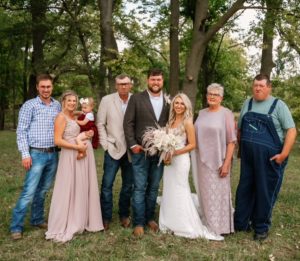Making a Livelihood With Livestock
Making a Livelihood With Livestock: A Whole-Farm Approach With Forage Crops and Cover Crops
 Thursday, Sept. 12 | 4-6 p.m.
Thursday, Sept. 12 | 4-6 p.m.
Location
17024 N Ave. | Bouton, IA 50039
Hosts
Dan & Ila Taylor and Noah, Sarah and Todd Taylor
Dan Taylor farms with his family, along with one full-time and two part-time employees, in southwest Iowa growing corn, soybeans and forage crops for their cattle. They also raise 2,400 pigs for Niman Ranch. With 2,300 acres of corn, soy and forage, Dan and his son, Noah, are passionate about finding a third crop for Iowa and have worked to grow and trial both canning and field peas. While Dan and Noah farm separately, they share the livestock 50-50.
Their cattle graze on a cereal rye cover crop in spring, made possible by their efforts to fence row-crop acres. This year, they will grow oats for oatlage, following that with millet also for summer forage. Dan values how bringing livestock onto the farm helps the local community by providing jobs on the farm and in local lockers. Join Dan and his family to learn more about how they’re integrating row crops and livestock, how they manage their cover crops and how they strive for crop diversity.
Meal
A meal will follow the field day.
See & Discuss
- Growing and chopping oatlage and millet following oats
- Cover crop management and seeding methods
- Integrating livestock with row crops and cover crop grazing
- Building and maintaining fencing
Sponsors
- Albert Lea Seed House
- Beaver Creek Watershed Management Authority
- Heartland Co-op
- Home State Bank
- Iowa Farmers Union
- Niman Ranch
Special Instructions for Visiting Farms With Livestock
We ask that all attendees at field days where livestock are present observe the following biosecurity practices. While biosecurity is important on all farms, clean shoes and clothes are particularly important due to the presence of highly pathogenic avian influenza (HPAI).
When visiting farms with livestock, we ask that attendees:
Wear clean shoes or boots that have not been worn on other farms with livestock or livestock buildings, or around a dense population of wild birds. If shoes or boots were worn around livestock or birds, they must be cleaned and disinfected.
Wear clean clothes that have not been worn around other livestock.
Upon request of the farmer host or PFI staff during the field day, you may be asked to disinfect shoes or boots in a phenol or similar solution or wear disposable plastic boot covers over your shoes (provided by PFI).
